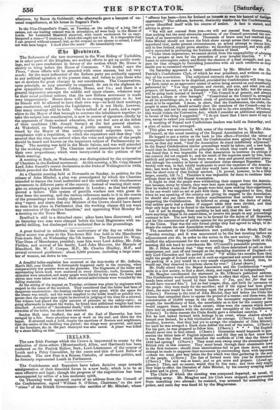be Vrobinces.
The Reformers of the new movement in the West Riding of Yorkshire, as in other parts of the kingdom, are making efforts to get up public meet-. jugs, and to pass resolutions in favour of the motion which Mr. Hume is shortly to bring before the House of Commons. " No doubt," says the Times, 'these efforts will be attended with some success, but not very much; for the most influential of the Reform party are evidently opposed to any political agitation at the present time, and refuse to join those who are so anxious for great changes in our constitution. The Conservatives, upon principle, as may naturally be supposed, do not in the slightest de- gree sympathize with Messrs. Cobden, Hume, and Co.; and there is a general impression amongst the middle and upper classes, whatever may be their usual political notions, that the new Reform movement is made very inopportunely. Hence there will be no strong opposition to it; but its friends will be allowed to have their own way—to hold their meetings, pass resolutions, and petition the Legislature. It is not likely, however, that many meetings will be held. One is talked of at Leeds, and a requi- sition to the Mayor of that borough to convene the inhabitants together, to take the subject into consideration, is now in course of signature, chiefly by the opponents of State-assisted education, who yet feel sore at the defeat of their candidate (Mr. Joseph Sturge) at the last general election. At Wakefield, on Tuesday evening, a public meeting was held, con- vened by the Mayor of that newly-constituted corporate town, in compliance with a requisition, in which the requisitors said that they 'felt assured that the time has arrived when the voice and opinion of the people should be heard and known on the important subject of Parliamentary re- form.' The meeting was held in the Music Saloon, and was well attended by the working classes." The Chartists carried amendments in favour of their own propositions; which were incorporated in the petition of the whole meeting.
A meeting at Bath, on Wednesday, was distinguished by the cooperation of Chartists in the Radical movement. At this meeting, a Mr. Crisp likened Lord John Russell's recent declaration to the Duke of Wellington's in 1830, which preceded the Reform Bill.
At a Chartist meeting held at Newcastle on Sunday, to petition for the release of John Mitchel, a plan was promulgated by which the Chartists intended to harass the local authorities and the military with simultaneous movements in different parts of the country, instead of wasting their ener- gies on attempting a great demonstration in London; as that had already proved a failure. This system of guerilla warfare met with great fa- vour from the meeting, and the various references made to it in the course of the proceedings were loudly cheered. A resolution was passed expres- sing "regret and alarm that any Minister of the Crown should have dared to state in his place in Parliament that the working classes did not want any extension of the elective franchise," and appointing Whit Monday for a meeting on the Town Moor.
Bradford is still in a disturbed state: pikes have been discovered; and on Saturday two men were charged before the local Magistrates with un- lawful drilling, but discharged for a technical flaw in the proceedings.
A great festival to celebrate the anniversary of the day on which the Royal assent was given to the Ten-hours Bill was held in the Manchester Free-trade Hall, on Wednesday the 7th instant. The Reverend Dr. Wray, Vice-Dean of Manchester, presided; near him were Lord Ashley, Mr. John Fielden, and several of his family, Lord John Manners the Marquis of Blandford, Mr. V/. F. Cowper, M.P., Mr. Charles Hindley, M.P., and several reverend gentlemen: about 3,000 persons, including a large num- ber of women, sat down to tea.
A dreadful boiler-explosion has occurred at the iron-works of Mr. Jefferies, Hart's Hill, near Dudley. It fortunately happened early in the morning, when comparatively few persons were on the premises. The fragments of the boiler and surrounding brick-work were scattered, in every direction; roofs, furnaces, and chimnies were smashed, and many people were buried in the ruins. No fewer than eleven men were taken out dead; while several indivividuals were wounded by the falling materials. At the sitting of the inquest on Tuesday, evidence was given by engineers with respect to the cause of the accident. They considered that the boiler had been of dangerous construction: the heating surface was very great, while the space for the steam was small; and the water supplied to the boiler would so quickly eva- porate that the engine-man might be deceived in judging of the time for a renewal. One witness had placed the right amount of pressure on the safety-valve: on going afterwards to inspect the works, he found that additional weights had been attached. A verdict of "Accidental death," with a reference to the defective con- struction of the boiler, has since been returned.
Sandon Hall, near Stafford, the seat of the Earl of Harrowby, has been ravaged by a fire. Some plumbers were at work on the roof, and there the fire began. It attained such a hold, despite the exertions of firemen and neighbours, that the centre of the building was gutted: the wings were preserved, and most of the furniture, &c. in the part destroyed was also saved. A joiner was killed by a atone falling on him.


























 Previous page
Previous page